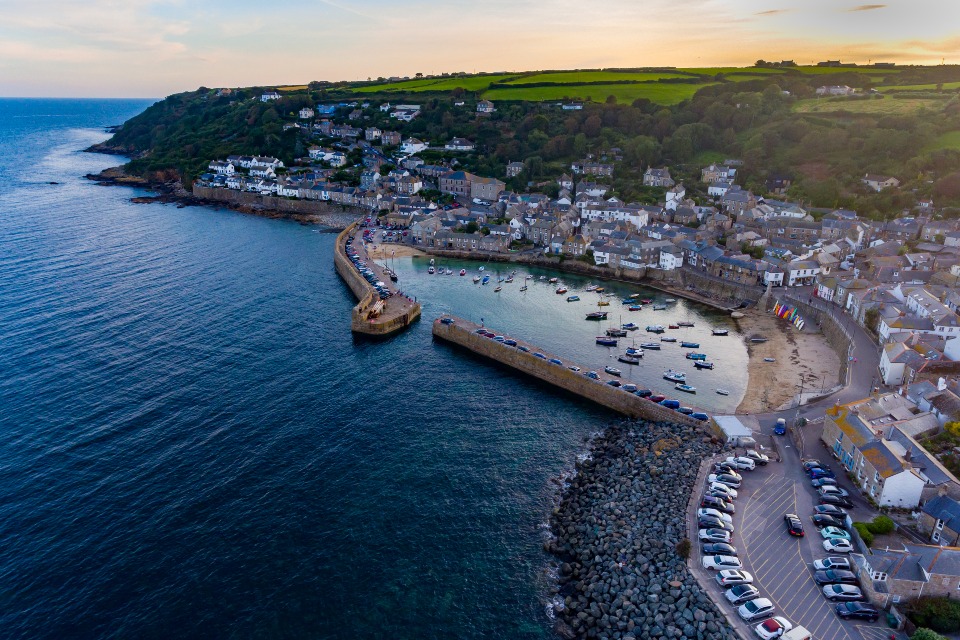Improving flood resilience in Mousehole
Updated 2 July 2025
Applies to England
1. Background
Mousehole is prone to flash flooding due to its steep valley and 2 main watercourses:
- the Paul Stream
- Tumble Tyn
Both watercourses flow directly through the village and discharge into the harbour.
The existing culvert systems are undersized and frequently overwhelmed during heavy rainfall. This gives the potential for significant flooding events.
2. The Mousehole Flood Alleviation Scheme
The Environment Agency is taking action to improve flood resilience to properties at risk from the 2 watercourses and surface water in Mousehole. We are using an integrated approach to make sure the local community is better protected from flooding.
This includes the following measures:
- nature based solutions - in the upper-catchment, we are working with local landowners, farmers and partner organisations including Cornwall Wildlife Trust to reduce overland flows into the village, improve flood resilience and deliver environmental benefits to the catchment
- improvements to the Paul Stream - our work here will maximise the overall capacity of the Paul Stream watercourse and associated drainage, to reduce surface water and overland flow within both the Mousehole Primary School playground and the wider community
- property flood resilience - we will install flood doors on eligible properties that remain at flood risk during more extreme events in Mousehole, when up to 160 properties are at risk

Aerial view of Mousehole Harbour, Cornwall (Credit: Environment Agency)
3. Nature based solutions
Nature based solutions are integrated and sustainable ways to manage water and reduce flood risk. They are about protecting, sustainably managing, and restoring our local ecosystems.
This helps:
- mitigate flood risk
- protect communities
- enhance resilience
Many of the nature based solutions measures we are working on to reduce flood risk in Mousehole provide additional benefits for wildlife and the community.
These include:
- improving soil health (structure and organic matter) - this leads to better water infiltration and increase in the soil’s capacity to hold water
- aeration of fields with compacted soil - this enhances soil health and improves water infiltration, as well as promoting optimal plant growth
- planting trees - this reduces flood risk by improving water infiltration and reducing or slowing run-off and also sequesters carbon emissions, as trees absorb carbon dioxide and produce oxygen
- returning certain land parcels to a more natural state (flood plains) - this will have a positive effect on biodiversity, improving/increasing natural habitats
Our land management team and Cornwall Wildlife Trust have surveyed and evaluated over 85% of agricultural land across both catchments.
This will make sure:
- we have the essential data and insights needed to design, implement, and monitor effective nature based solutions
- they are adapted to the specific conditions and challenges of the land
4. Improvements to Paul Stream
The aim of the civil improvement works is to:
- maximise the overall capacity of the Paul Stream watercourse and associated drainage
- reduce surface water and overland flow within both the Mousehole Primary School playground and the wider community
We are currently revising the design for a more traditional culvert replacement following the existing line, which is located under the Mousehole Primary School playground. The new design will involve minimal above ground changes and additional channel drainage to capture overland flow.
There will always be limitations to the amount of flow that can be carried through Paul Stream. This is due to restrictions downstream of the school. To compensate for this, we have oversized the new culvert and local drainage proposals. This will allow for additional storage during times of flooding.
Whilst the risk of flooding cannot be completely removed in this area, the frequency of flooding will be notably reduced. Once the final design is approved, we will start the procurement process to begin the construction works. We expect anticipate construction to start in summer 2025.
5. Property flood resilience (PFR)
We will install property level resilience measures, such as flood doors, on some eligible properties that remain at risk during more extreme flooding in Mousehole.
A conservation area covers a large proportion of Mousehole. We are working closely with the Local Planning Authority’s conservation officer, to make sure the proposals are in keeping with the historic setting. A range of wooden and composite doors are being considered. Listed properties will require Listed Building Consent and will feature wooden ‘heritage’ doors. All products will be tested and certified to British Standards.
Due to challenges around sourcing the right products for homes, there have been delays to the delivery schedule. This has provided opportunities for the products to go through a round of refinement and further testing.
While recognising that this delay will cause inconvenience to residents, we remain committed to:
- delivering high quality flood doors that meet homeowner and Environment Agency expectations
- the requirements of the conservation area
6. Latest update
We have completed the design for a traditional culvert replacement following the existing line, which is located under the Mousehole Primary School playground. The design will involve minimal above ground changes and additional channel drainage to capture overland flow.
Following the procurement process, the construction contract has been awarded to Kier Integrated Services Ltd. Mobilisation to the site compound began on 30 June 2025, and the main works within Mousehole Primary school will commence 21 July 2025. These works are timed to coincide with the school summer holidays, to reduce the impact upon the school.
We anticipate construction completion in winter 2025.
7. Contact us
You can email DCISenquiries@environment-agency.gov.uk to find out more about the Mousehole flood alleviation scheme.

